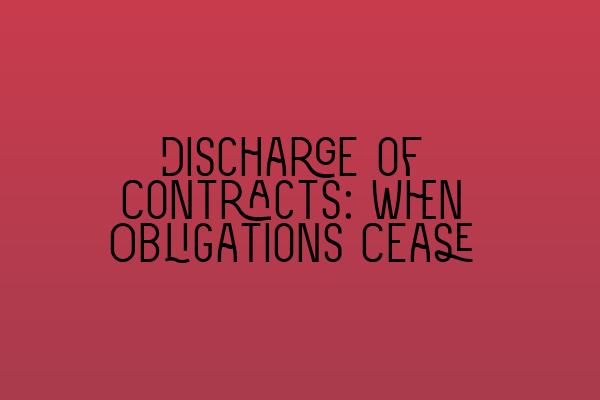Discharge of Contracts: When Obligations Cease
Contracts form the foundation of business transactions and provide parties with the security of knowing that their rights and obligations are legally enforceable. However, it is essential to understand that contracts do not last indefinitely. There are circumstances in which the obligations outlined in a contract can come to an end. This process is known as the discharge of a contract.
1. Performance
One of the most common ways in which a contract can be discharged is through performance. When both parties fulfill their respective obligations as outlined in the contract, the contract is said to be discharged by performance. This requires each party to satisfactorily carry out their duties as agreed upon.
For example, let’s say Company A contracts with Company B to deliver a specific quantity of goods. If Company A provides the goods and Company B pays the agreed-upon price, the contract would be discharged by performance.
To learn more about the impact of frustration on contractual obligations, click here.
2. Agreement
Another way in which a contract can be discharged is through agreement. If both parties agree to terminate the contract before performance occurs, it is called discharge by agreement. This can happen when there are changes in circumstances or when the parties mutually decide that continuing with the contract is no longer beneficial.
For instance, if Company A and Company B enter into a contract for the supply of services, but later decide that the services are no longer required, they may agree to terminate the contract before any performance takes place.
To gain insights into interpreting contractual clauses, visit this article.
3. Breach
Contracts can also be discharged due to a breach by one of the parties. When a party fails to fulfill their obligations as outlined in the contract, it is considered a breach. The innocent party has the option to accept the breach and terminate the contract, or they may choose to continue with the contract and seek damages for the breach.
For example, if Company A agrees to deliver goods to Company B by a certain date but fails to do so, Company B may choose to terminate the contract due to the breach.
4. Frustration
In some instances, unforeseen events or circumstances may occur that make it impossible to fulfill the obligations of a contract. This is known as frustration, and in such cases, the contract may be discharged. Frustration occurs when an event renders the contract legally or physically impossible to perform, or it transforms the obligations of the parties into something radically different from what was originally agreed upon.
To explore the impact of frustration on contractual obligations further, please read our detailed legal insights article.
Conclusion
Understanding the circumstances in which a contract can be discharged is crucial for parties involved in business transactions. Whether it is through performance, agreement, breach, or frustration, it is essential to be aware of the various ways obligations can cease. Properly navigating the discharge of a contract can help protect your rights and ensure a fair resolution in the event of a dispute.
For entrepreneurs and business owners, familiarizing yourself with the legal aspects of business contracts is essential. Visit our article on key considerations for entrepreneurs in business contracts.
For those interested in the comparative analysis between SQE Contract Law and traditional qualifications, find out more in our comprehensive article: SQE Contract Law vs. Traditional Qualifications: A Comparative Analysis.
Lastly, to delve into the various types of agreements in contract law, check out our informative article: Agreements in Contract Law: Understanding Its Various Types.
